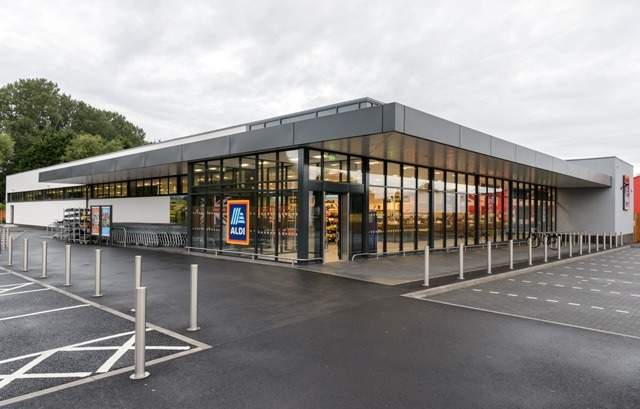Discount supermarket chain Aldi has introduced fully recyclable pizza discs across its range to ensure 100% recyclable own-label product packaging by 2022.

Image: Aldi external store. Photo: courtesy of Aldi.
Made from cardboard instead of polystyrene, the discs are expected to save nearly 180 tons of plastic from circulation, and the switchover will result in nearly 500 fewer trucks a year to transport the waste.
The discs are used to protect the packaged product. Aldi was the first in the UK to sign up to WRAP’s plastics pact.
In addition, Aldi is also reducing the size of its ‘Thin & Crispy’ pizza cartons without reducing the size of the pizza, which will cut the amount of cardboard by 73 tons a year.
Even though polystyrene discs offer product protection, they have been causing a major waste problem with hundreds of tons going to landfill every year.
Aldi UK managing director of corporate responsibility Fritz Walleczek said: “Polystyrene pizza discs are a serial offender when it comes to waste packaging, so it’s important that we tackle this issue directly.
“This move is one part of a much larger campaign to reduce our environmental impact wherever possible – be that food waste, packaging or emissions.
“Introducing recyclable pizza discs across our entire range is another step towards our aim for all product packaging to be 100% recyclable by 2025.”
In March 2018, Aldi announced a 10-point plastics and packaging strategy under which the company will stop the use of all single-use plastic bags by the end of 2018 and ensure all own-label product packaging is fully recyclable by 2022.
Instead of carrier bags, the supermarket will offer customers bags for life as reusable 9p bags, which will be made from back-of-store plastic waste.
After announcing the strategy, Aldi has brought about several changes to packaging, including replacing black plastic packaging for clear, recyclable versions on all cooked sliced meats and on a range of fruit and vegetables.
The company claims that the changes will save more than 2,000 tons of plastic waste a year.
Previously, British consumer co-operative Co-op replaced its polystyrene pizza discs with corrugated cardboard in 2017.
